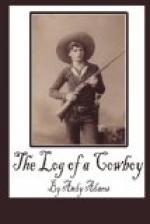All hands rounded in the herd, and drifting them out nearly a mile from the river, left them under two herders, when the remainder of us returned to the bogged cattle. There were by actual count, including those down at the crossing, over eighty bogged cattle that required our attention, extending over a space of a mile or more above the island ford.
The outlook was anything but pleasing. Flood was almost speechless over the situation, for it might have been guarded against. But realizing the task before us, we recrossed the river for dinner, well knowing the inner man needed fortifying for the work before us. No sooner had we disposed of the meal and secured a change of mounts all round, than we sent two men to relieve the men on herd. When they were off, Flood divided up our forces for the afternoon work.
“It will never do,” said he, “to get separated from our commissary. So, Priest, you take the wagon and remuda and go back up to the regular crossing and get our wagon over somehow. There will be the cook and wrangler besides yourself, and you may have two other men. You will have to lighten your load; and don’t attempt to cross those mules hitched to the wagon; rely on your saddle horses for getting the wagon over. Forrest, you and Bull, with the two men on herd, take the cattle to the nearest creek and water them well. After watering, drift them back, so they will be within a mile of these bogged cattle. Then leave two men with them and return to the river. I’ll take the remainder of the outfit and begin at the ford and work up the river. Get the ropes and hobbles, boys, and come on.”
John Officer and I were left with The Rebel to get the wagon across, and while waiting for the men on herd to get in, we hooked up the mules. Honeyman had the remuda in hand to start the minute our herders returned, their change of mounts being already tied to the wagon wheels. The need of haste was very imperative, for the river might rise without an hour’s notice, and a two-foot rise would drown every hoof in the river as well as cut us off from our wagon. The South Canadian has its source in the Staked Plains and the mountains of New Mexico, and freshets there would cause a rise here, local conditions never affecting a river of such width. Several of us had seen these Plains rivers,—when the mountain was sportive and dallying with the plain,—under a clear sky and without any warning of falling weather, rise with a rush of water like a tidal wave or the stream from a broken dam. So when our men from herd galloped in, we stripped their saddles from tired horses and cinched them to fresh ones, while they, that there might be no loss of time, bolted their dinners. It took us less than an hour to reach the ford, where we unloaded the wagon of everything but the chuck-box, which was ironed fast. We had an extra saddle in the wagon, and McCann was mounted on a good horse, for he could ride as well as cook. Priest and




